Exploring Ethical Implications of Drone Program using Theories
VerifiedAdded on 2023/06/12
|6
|1268
|220
Essay
AI Summary
This essay critically examines the use of drone programs through the lens of Ethical Fundamentalism, particularly in the context of counter-terrorism efforts by the United States. It discusses how the theory's emphasis on adherence to central authority and pre-defined rules influences decision-making processes, citing the controversial 'kill list' and the collateral damage resulting from drone strikes, specifically referencing the case of Anwar al-Awlaki and his son. The essay contrasts Ethical Fundamentalism with other ethical considerations, such as consequentialism, and questions the morality and effectiveness of drone warfare, ultimately arguing that while eliminating terrorism is a vital goal, the ethical implications and consequences of drone programs, including the radicalization of youths and the killing of innocent civilians, cannot be ignored. The essay concludes by emphasizing the importance of considering the success rate and consequences of decisions in ethical theories.
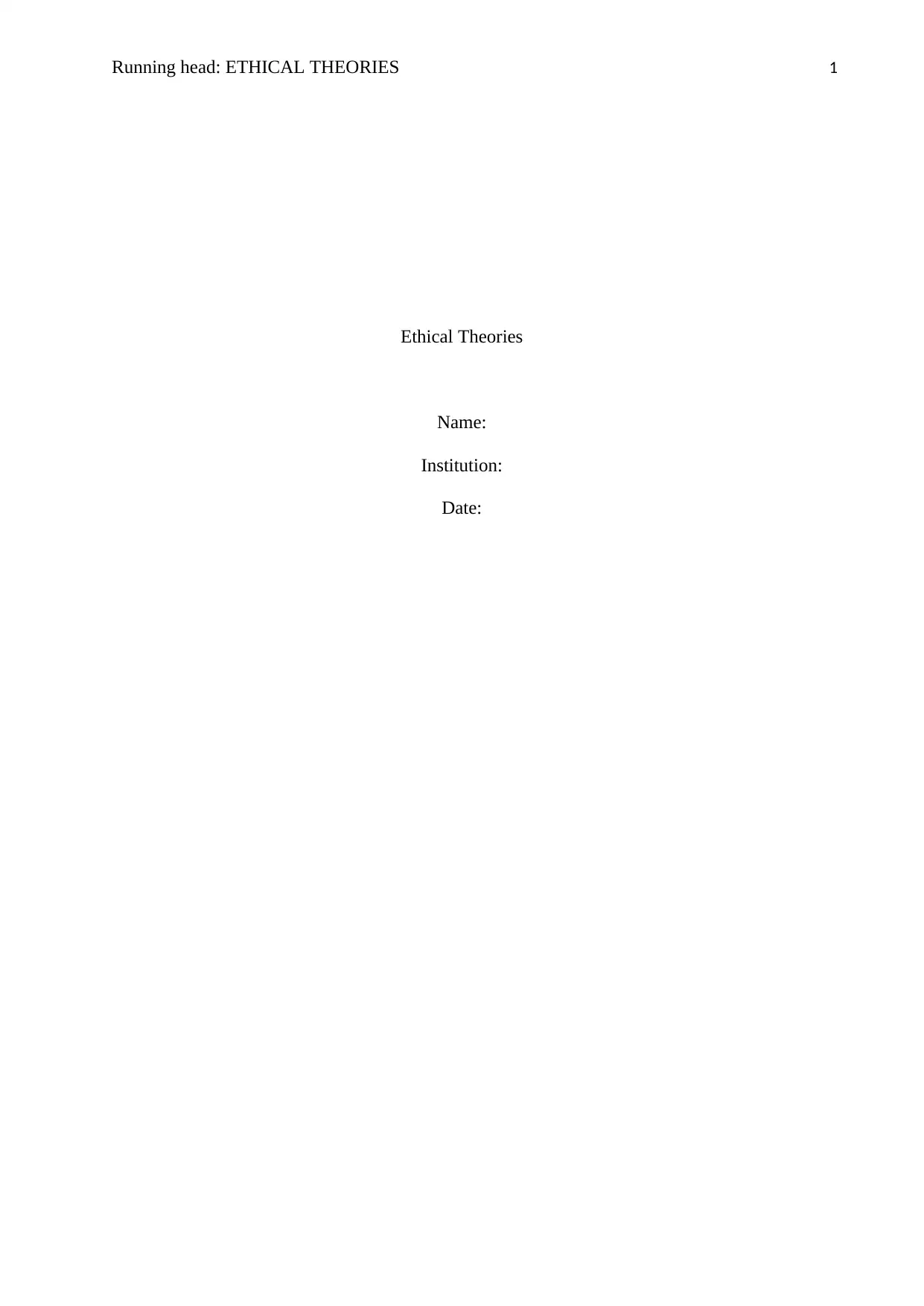
Running head: ETHICAL THEORIES 1
Ethical Theories
Name:
Institution:
Date:
Ethical Theories
Name:
Institution:
Date:
Paraphrase This Document
Need a fresh take? Get an instant paraphrase of this document with our AI Paraphraser
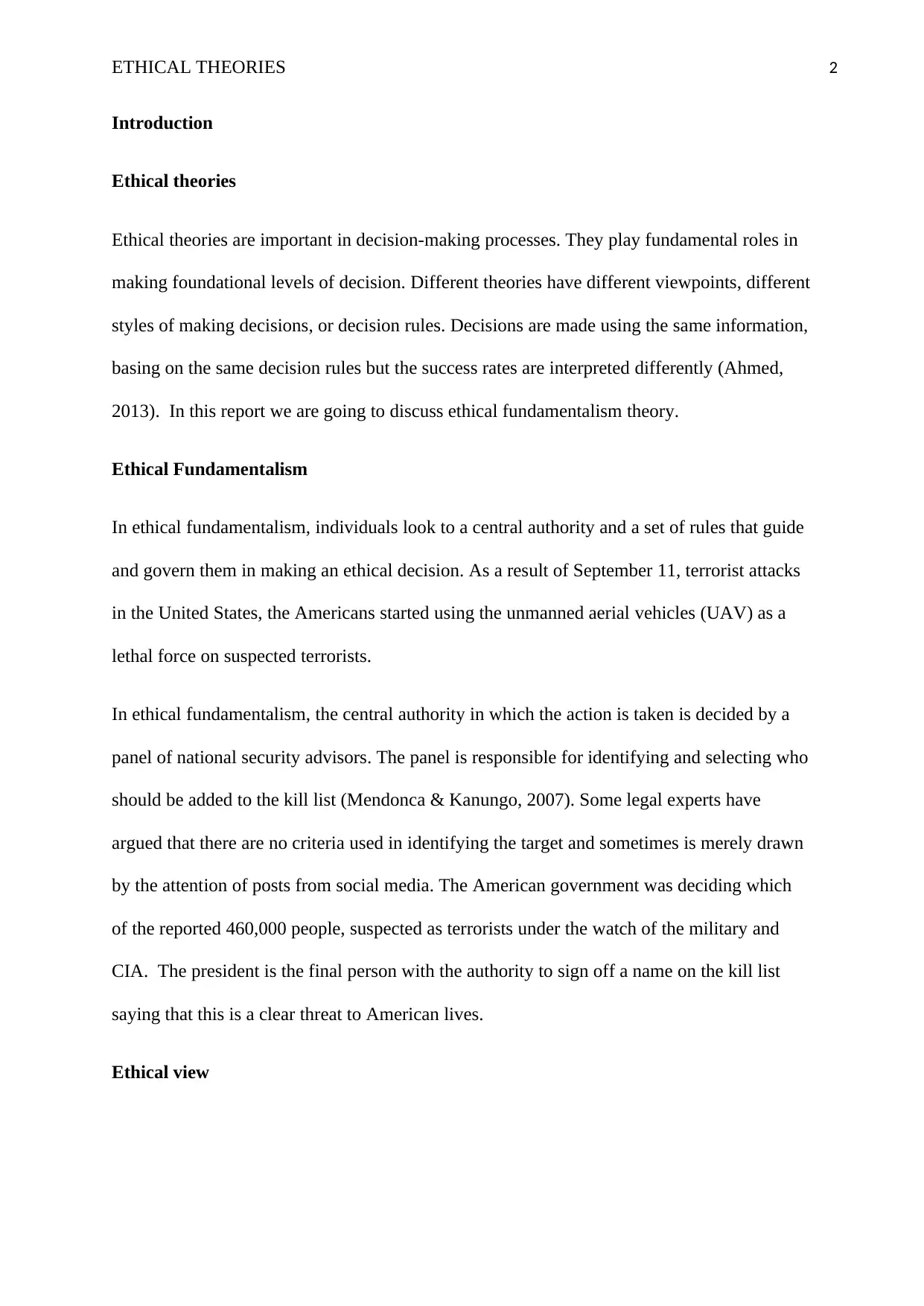
ETHICAL THEORIES 2
Introduction
Ethical theories
Ethical theories are important in decision-making processes. They play fundamental roles in
making foundational levels of decision. Different theories have different viewpoints, different
styles of making decisions, or decision rules. Decisions are made using the same information,
basing on the same decision rules but the success rates are interpreted differently (Ahmed,
2013). In this report we are going to discuss ethical fundamentalism theory.
Ethical Fundamentalism
In ethical fundamentalism, individuals look to a central authority and a set of rules that guide
and govern them in making an ethical decision. As a result of September 11, terrorist attacks
in the United States, the Americans started using the unmanned aerial vehicles (UAV) as a
lethal force on suspected terrorists.
In ethical fundamentalism, the central authority in which the action is taken is decided by a
panel of national security advisors. The panel is responsible for identifying and selecting who
should be added to the kill list (Mendonca & Kanungo, 2007). Some legal experts have
argued that there are no criteria used in identifying the target and sometimes is merely drawn
by the attention of posts from social media. The American government was deciding which
of the reported 460,000 people, suspected as terrorists under the watch of the military and
CIA. The president is the final person with the authority to sign off a name on the kill list
saying that this is a clear threat to American lives.
Ethical view
Introduction
Ethical theories
Ethical theories are important in decision-making processes. They play fundamental roles in
making foundational levels of decision. Different theories have different viewpoints, different
styles of making decisions, or decision rules. Decisions are made using the same information,
basing on the same decision rules but the success rates are interpreted differently (Ahmed,
2013). In this report we are going to discuss ethical fundamentalism theory.
Ethical Fundamentalism
In ethical fundamentalism, individuals look to a central authority and a set of rules that guide
and govern them in making an ethical decision. As a result of September 11, terrorist attacks
in the United States, the Americans started using the unmanned aerial vehicles (UAV) as a
lethal force on suspected terrorists.
In ethical fundamentalism, the central authority in which the action is taken is decided by a
panel of national security advisors. The panel is responsible for identifying and selecting who
should be added to the kill list (Mendonca & Kanungo, 2007). Some legal experts have
argued that there are no criteria used in identifying the target and sometimes is merely drawn
by the attention of posts from social media. The American government was deciding which
of the reported 460,000 people, suspected as terrorists under the watch of the military and
CIA. The president is the final person with the authority to sign off a name on the kill list
saying that this is a clear threat to American lives.
Ethical view
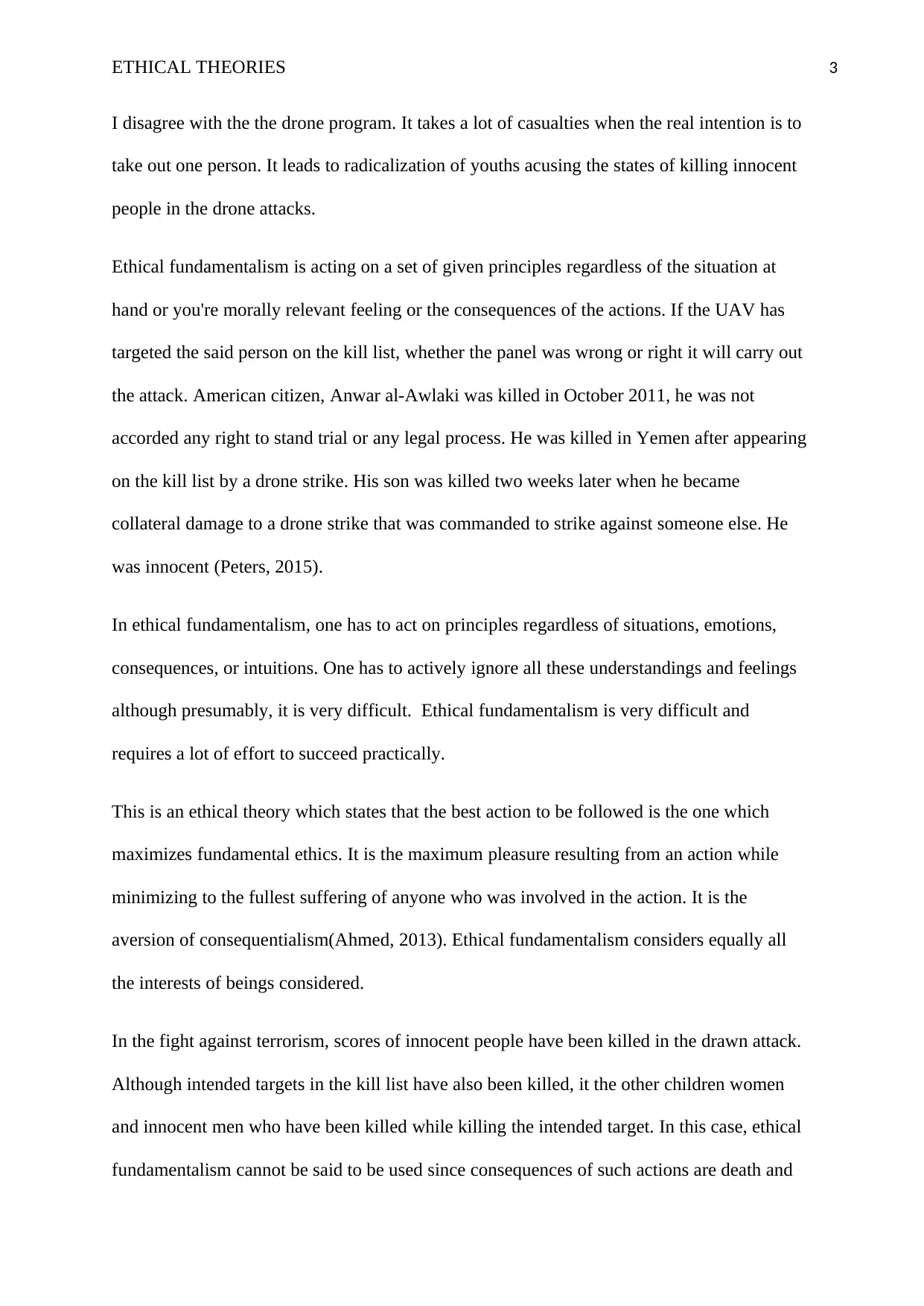
ETHICAL THEORIES 3
I disagree with the the drone program. It takes a lot of casualties when the real intention is to
take out one person. It leads to radicalization of youths acusing the states of killing innocent
people in the drone attacks.
Ethical fundamentalism is acting on a set of given principles regardless of the situation at
hand or you're morally relevant feeling or the consequences of the actions. If the UAV has
targeted the said person on the kill list, whether the panel was wrong or right it will carry out
the attack. American citizen, Anwar al-Awlaki was killed in October 2011, he was not
accorded any right to stand trial or any legal process. He was killed in Yemen after appearing
on the kill list by a drone strike. His son was killed two weeks later when he became
collateral damage to a drone strike that was commanded to strike against someone else. He
was innocent (Peters, 2015).
In ethical fundamentalism, one has to act on principles regardless of situations, emotions,
consequences, or intuitions. One has to actively ignore all these understandings and feelings
although presumably, it is very difficult. Ethical fundamentalism is very difficult and
requires a lot of effort to succeed practically.
This is an ethical theory which states that the best action to be followed is the one which
maximizes fundamental ethics. It is the maximum pleasure resulting from an action while
minimizing to the fullest suffering of anyone who was involved in the action. It is the
aversion of consequentialism(Ahmed, 2013). Ethical fundamentalism considers equally all
the interests of beings considered.
In the fight against terrorism, scores of innocent people have been killed in the drawn attack.
Although intended targets in the kill list have also been killed, it the other children women
and innocent men who have been killed while killing the intended target. In this case, ethical
fundamentalism cannot be said to be used since consequences of such actions are death and
I disagree with the the drone program. It takes a lot of casualties when the real intention is to
take out one person. It leads to radicalization of youths acusing the states of killing innocent
people in the drone attacks.
Ethical fundamentalism is acting on a set of given principles regardless of the situation at
hand or you're morally relevant feeling or the consequences of the actions. If the UAV has
targeted the said person on the kill list, whether the panel was wrong or right it will carry out
the attack. American citizen, Anwar al-Awlaki was killed in October 2011, he was not
accorded any right to stand trial or any legal process. He was killed in Yemen after appearing
on the kill list by a drone strike. His son was killed two weeks later when he became
collateral damage to a drone strike that was commanded to strike against someone else. He
was innocent (Peters, 2015).
In ethical fundamentalism, one has to act on principles regardless of situations, emotions,
consequences, or intuitions. One has to actively ignore all these understandings and feelings
although presumably, it is very difficult. Ethical fundamentalism is very difficult and
requires a lot of effort to succeed practically.
This is an ethical theory which states that the best action to be followed is the one which
maximizes fundamental ethics. It is the maximum pleasure resulting from an action while
minimizing to the fullest suffering of anyone who was involved in the action. It is the
aversion of consequentialism(Ahmed, 2013). Ethical fundamentalism considers equally all
the interests of beings considered.
In the fight against terrorism, scores of innocent people have been killed in the drawn attack.
Although intended targets in the kill list have also been killed, it the other children women
and innocent men who have been killed while killing the intended target. In this case, ethical
fundamentalism cannot be said to be used since consequences of such actions are death and
⊘ This is a preview!⊘
Do you want full access?
Subscribe today to unlock all pages.

Trusted by 1+ million students worldwide
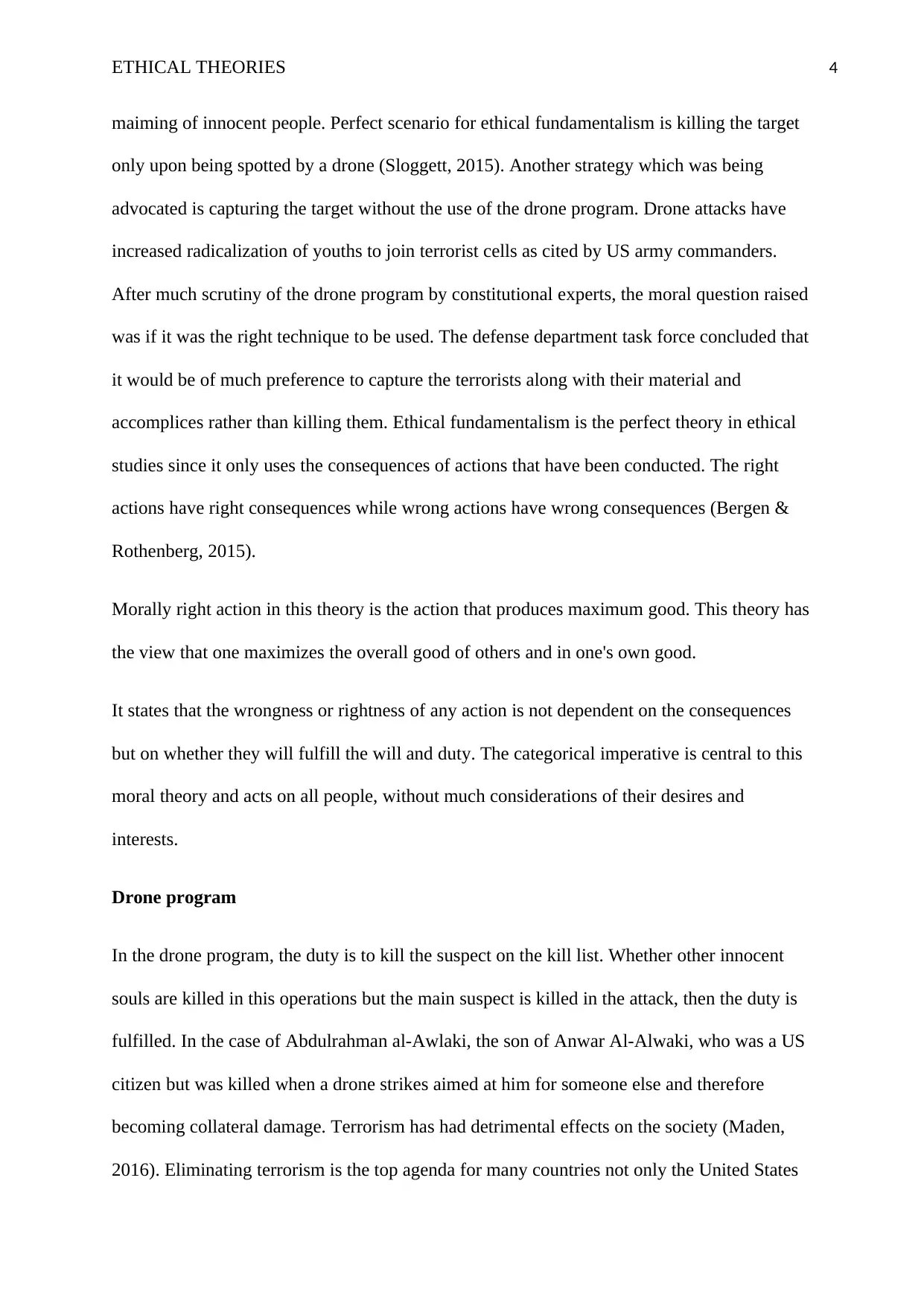
ETHICAL THEORIES 4
maiming of innocent people. Perfect scenario for ethical fundamentalism is killing the target
only upon being spotted by a drone (Sloggett, 2015). Another strategy which was being
advocated is capturing the target without the use of the drone program. Drone attacks have
increased radicalization of youths to join terrorist cells as cited by US army commanders.
After much scrutiny of the drone program by constitutional experts, the moral question raised
was if it was the right technique to be used. The defense department task force concluded that
it would be of much preference to capture the terrorists along with their material and
accomplices rather than killing them. Ethical fundamentalism is the perfect theory in ethical
studies since it only uses the consequences of actions that have been conducted. The right
actions have right consequences while wrong actions have wrong consequences (Bergen &
Rothenberg, 2015).
Morally right action in this theory is the action that produces maximum good. This theory has
the view that one maximizes the overall good of others and in one's own good.
It states that the wrongness or rightness of any action is not dependent on the consequences
but on whether they will fulfill the will and duty. The categorical imperative is central to this
moral theory and acts on all people, without much considerations of their desires and
interests.
Drone program
In the drone program, the duty is to kill the suspect on the kill list. Whether other innocent
souls are killed in this operations but the main suspect is killed in the attack, then the duty is
fulfilled. In the case of Abdulrahman al-Awlaki, the son of Anwar Al-Alwaki, who was a US
citizen but was killed when a drone strikes aimed at him for someone else and therefore
becoming collateral damage. Terrorism has had detrimental effects on the society (Maden,
2016). Eliminating terrorism is the top agenda for many countries not only the United States
maiming of innocent people. Perfect scenario for ethical fundamentalism is killing the target
only upon being spotted by a drone (Sloggett, 2015). Another strategy which was being
advocated is capturing the target without the use of the drone program. Drone attacks have
increased radicalization of youths to join terrorist cells as cited by US army commanders.
After much scrutiny of the drone program by constitutional experts, the moral question raised
was if it was the right technique to be used. The defense department task force concluded that
it would be of much preference to capture the terrorists along with their material and
accomplices rather than killing them. Ethical fundamentalism is the perfect theory in ethical
studies since it only uses the consequences of actions that have been conducted. The right
actions have right consequences while wrong actions have wrong consequences (Bergen &
Rothenberg, 2015).
Morally right action in this theory is the action that produces maximum good. This theory has
the view that one maximizes the overall good of others and in one's own good.
It states that the wrongness or rightness of any action is not dependent on the consequences
but on whether they will fulfill the will and duty. The categorical imperative is central to this
moral theory and acts on all people, without much considerations of their desires and
interests.
Drone program
In the drone program, the duty is to kill the suspect on the kill list. Whether other innocent
souls are killed in this operations but the main suspect is killed in the attack, then the duty is
fulfilled. In the case of Abdulrahman al-Awlaki, the son of Anwar Al-Alwaki, who was a US
citizen but was killed when a drone strikes aimed at him for someone else and therefore
becoming collateral damage. Terrorism has had detrimental effects on the society (Maden,
2016). Eliminating terrorism is the top agenda for many countries not only the United States
Paraphrase This Document
Need a fresh take? Get an instant paraphrase of this document with our AI Paraphraser
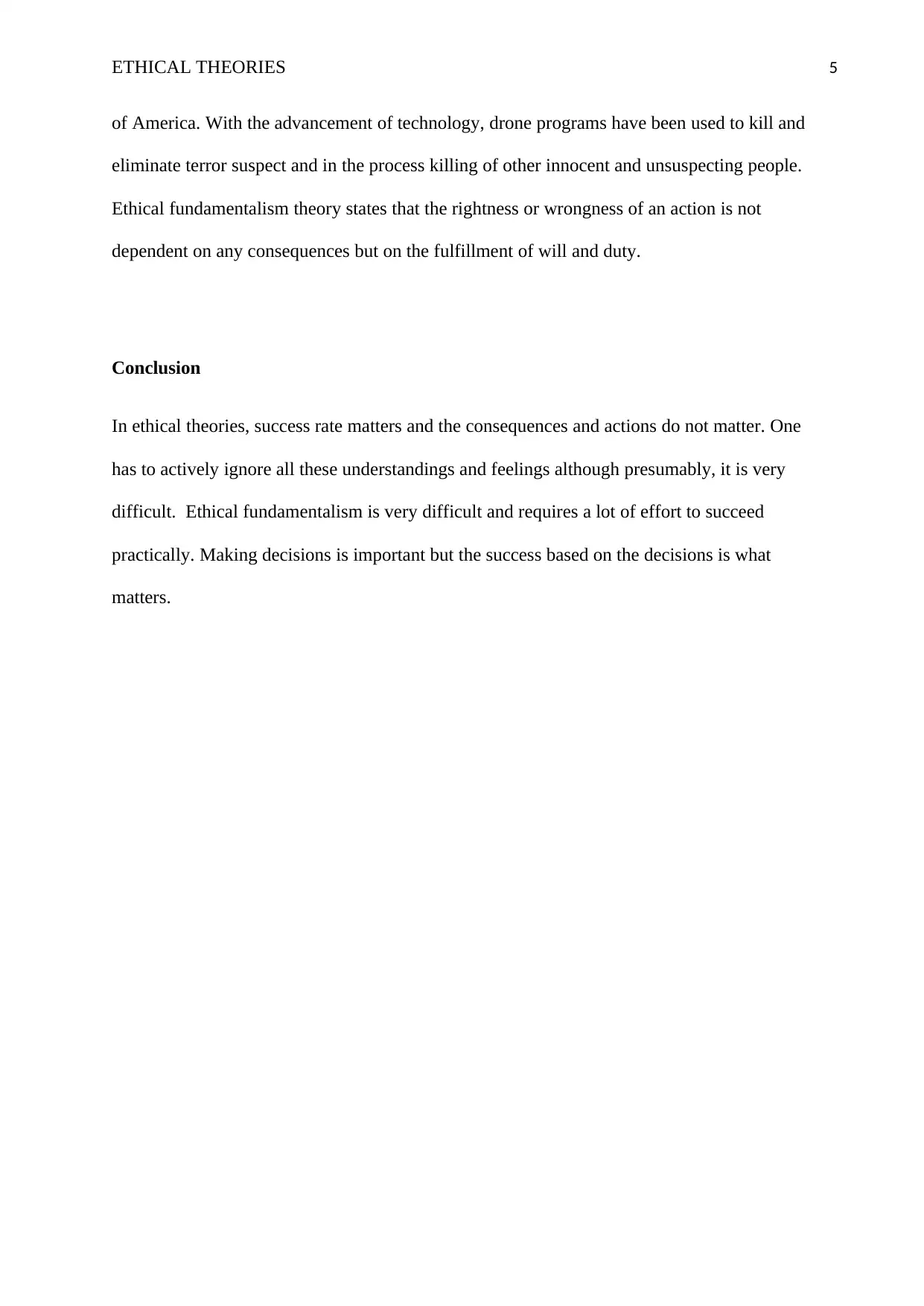
ETHICAL THEORIES 5
of America. With the advancement of technology, drone programs have been used to kill and
eliminate terror suspect and in the process killing of other innocent and unsuspecting people.
Ethical fundamentalism theory states that the rightness or wrongness of an action is not
dependent on any consequences but on the fulfillment of will and duty.
Conclusion
In ethical theories, success rate matters and the consequences and actions do not matter. One
has to actively ignore all these understandings and feelings although presumably, it is very
difficult. Ethical fundamentalism is very difficult and requires a lot of effort to succeed
practically. Making decisions is important but the success based on the decisions is what
matters.
of America. With the advancement of technology, drone programs have been used to kill and
eliminate terror suspect and in the process killing of other innocent and unsuspecting people.
Ethical fundamentalism theory states that the rightness or wrongness of an action is not
dependent on any consequences but on the fulfillment of will and duty.
Conclusion
In ethical theories, success rate matters and the consequences and actions do not matter. One
has to actively ignore all these understandings and feelings although presumably, it is very
difficult. Ethical fundamentalism is very difficult and requires a lot of effort to succeed
practically. Making decisions is important but the success based on the decisions is what
matters.
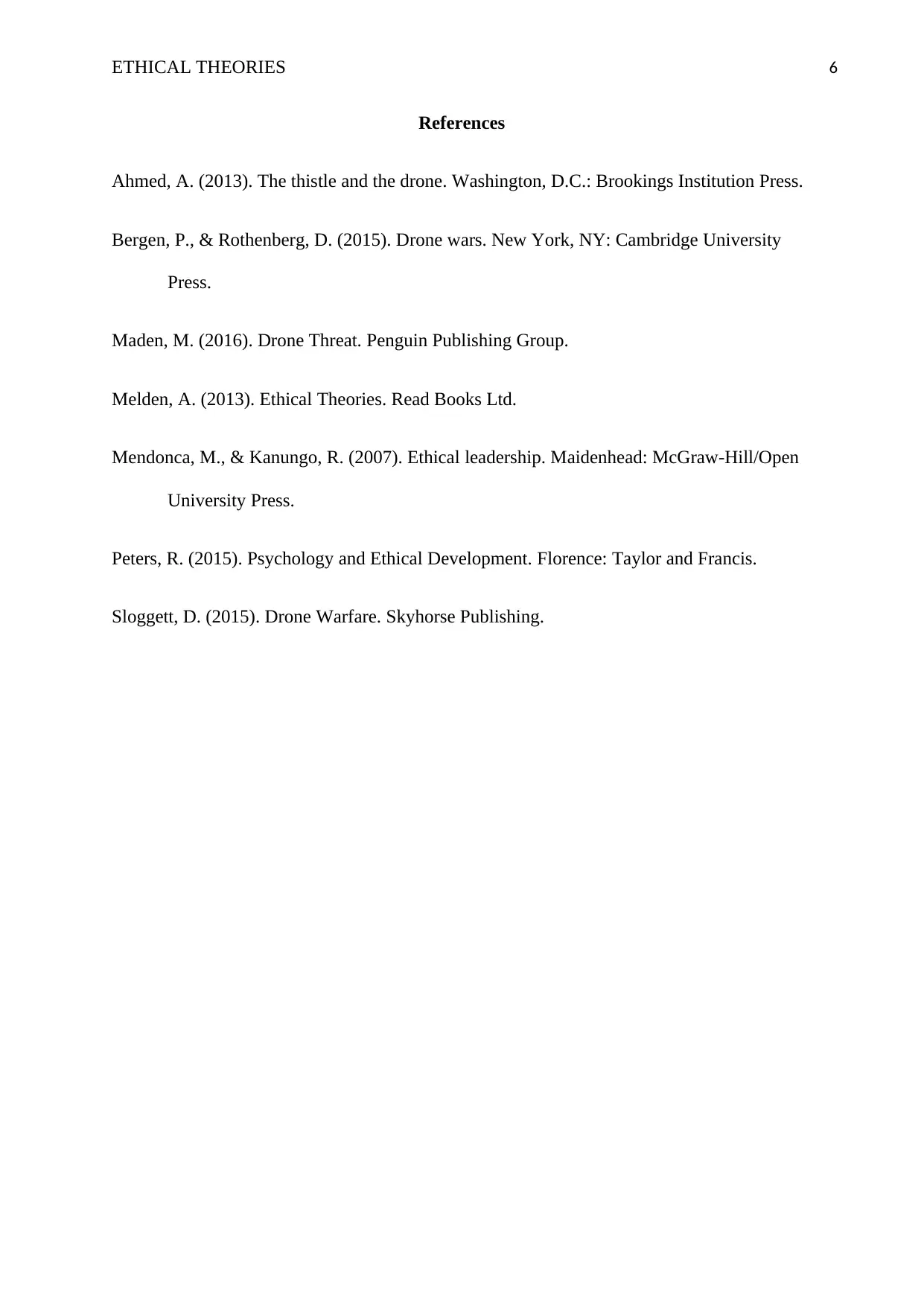
ETHICAL THEORIES 6
References
Ahmed, A. (2013). The thistle and the drone. Washington, D.C.: Brookings Institution Press.
Bergen, P., & Rothenberg, D. (2015). Drone wars. New York, NY: Cambridge University
Press.
Maden, M. (2016). Drone Threat. Penguin Publishing Group.
Melden, A. (2013). Ethical Theories. Read Books Ltd.
Mendonca, M., & Kanungo, R. (2007). Ethical leadership. Maidenhead: McGraw-Hill/Open
University Press.
Peters, R. (2015). Psychology and Ethical Development. Florence: Taylor and Francis.
Sloggett, D. (2015). Drone Warfare. Skyhorse Publishing.
References
Ahmed, A. (2013). The thistle and the drone. Washington, D.C.: Brookings Institution Press.
Bergen, P., & Rothenberg, D. (2015). Drone wars. New York, NY: Cambridge University
Press.
Maden, M. (2016). Drone Threat. Penguin Publishing Group.
Melden, A. (2013). Ethical Theories. Read Books Ltd.
Mendonca, M., & Kanungo, R. (2007). Ethical leadership. Maidenhead: McGraw-Hill/Open
University Press.
Peters, R. (2015). Psychology and Ethical Development. Florence: Taylor and Francis.
Sloggett, D. (2015). Drone Warfare. Skyhorse Publishing.
⊘ This is a preview!⊘
Do you want full access?
Subscribe today to unlock all pages.

Trusted by 1+ million students worldwide
1 out of 6
Your All-in-One AI-Powered Toolkit for Academic Success.
+13062052269
info@desklib.com
Available 24*7 on WhatsApp / Email
![[object Object]](/_next/static/media/star-bottom.7253800d.svg)
Unlock your academic potential
Copyright © 2020–2025 A2Z Services. All Rights Reserved. Developed and managed by ZUCOL.
